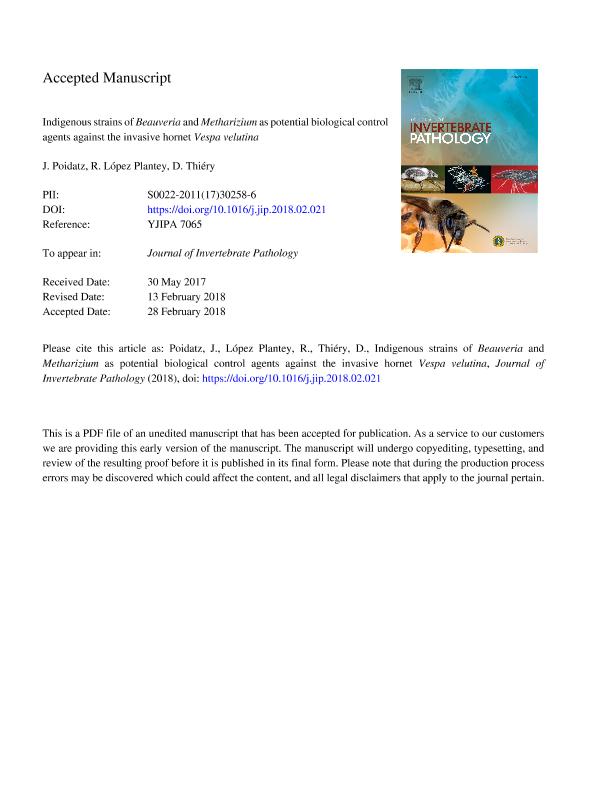Mostrar el registro sencillo del ítem
dc.contributor.author
Poidatz, J.
dc.contributor.author
López Plantey, Rodrigo Javier

dc.contributor.author
Thiéry, D.
dc.date.available
2019-11-29T21:43:00Z
dc.date.issued
2018-03
dc.identifier.citation
Poidatz, J.; López Plantey, Rodrigo Javier; Thiéry, D.; Indigenous strains of Beauveria and Metharizium as potential biological control agents against the invasive hornet Vespa velutina; Academic Press Inc Elsevier Science; Journal of Invertebrate Pathology; 153; 3-2018; 180-185
dc.identifier.issn
0022-2011
dc.identifier.uri
http://hdl.handle.net/11336/91050
dc.description.abstract
Alien species often miss parasites in their invaded area, and this is the case in Vespa velutina. This invasive hornet predator of bees was accidentally introduced in Europe from East China in 2004. The control of this species is still problematic. Indeed to destroy nests, applicators currently use large spectrum insecticides, which is too costly or dangerous to applicators and also to the environment, affecting non-targeted arthropods (one period). Studying the potential interest of biological control methods may help to propose alternatives in V. velutina control. We present here the bioassays in which we assessed the potential control efficiency of different indigenous French isolates of entomopathogenic fungi. We inoculated adults V. velutina by different ways: being directly, by walking on a contaminated surface, in the food, or by inter-individual transfers. We tested differences between the isolates and the application methods using two parameters mortality and LT50. The direct inoculation method was the most efficient modality, then the contact, transfer and food. Considering all contamination methods, there was no difference on susceptibility or mortality among different isolates. Still the LT50 was quite short in all isolates (average 5.8 ± 0.44d), and their virulence was quite high: we conclude that there is high potential in using such entomopathogens as a biological control agent against V. velutina.
dc.format
application/pdf
dc.language.iso
eng
dc.publisher
Academic Press Inc Elsevier Science

dc.rights
info:eu-repo/semantics/openAccess
dc.rights.uri
https://creativecommons.org/licenses/by-nc-nd/2.5/ar/
dc.subject
ASIAN HORNET
dc.subject
BEAUVERIA BASSIANA
dc.subject
BIOLOGICAL CONTROL
dc.subject
METARHIZIUM ROBERTSII
dc.subject.classification
Biotecnología Agrícola y Biotecnología Alimentaria

dc.subject.classification
Biotecnología Agropecuaria

dc.subject.classification
CIENCIAS AGRÍCOLAS

dc.title
Indigenous strains of Beauveria and Metharizium as potential biological control agents against the invasive hornet Vespa velutina
dc.type
info:eu-repo/semantics/article
dc.type
info:ar-repo/semantics/artículo
dc.type
info:eu-repo/semantics/publishedVersion
dc.date.updated
2019-10-15T14:13:15Z
dc.journal.volume
153
dc.journal.pagination
180-185
dc.journal.pais
Estados Unidos

dc.description.fil
Fil: Poidatz, J.. Institut National de la Recherche Agronomique; Francia
dc.description.fil
Fil: López Plantey, Rodrigo Javier. Consejo Nacional de Investigaciones Científicas y Técnicas. Centro Científico Tecnológico Conicet - Mendoza. Instituto de Biología Agrícola de Mendoza. Universidad Nacional de Cuyo. Facultad de Ciencias Agrarias. Instituto de Biología Agrícola de Mendoza; Argentina
dc.description.fil
Fil: Thiéry, D.. Institut National de la Recherche Agronomique; Francia
dc.journal.title
Journal of Invertebrate Pathology

dc.relation.alternativeid
info:eu-repo/semantics/altIdentifier/url/https://www.sciencedirect.com/science/article/pii/S0022201117302586
dc.relation.alternativeid
info:eu-repo/semantics/altIdentifier/doi/http://dx.doi.org/10.1016/j.jip.2018.02.021
Archivos asociados
